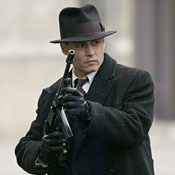- REVIEW
- READER REVIEWS
Public Enemies
|
(No longer in theaters)
|
|
Genre
Action/Adventure, Suspense/Thriller
Producer
Michael Mann
Distributor
Universal Studios
Release Date
Jul 1, 2009
Release Notes
Nationwide
Official Website
Review
One nice thing about Public Enemies (there are more of them, but not enough) is that Johnny Depp palpably loves being a movie star and loves wearing wide-brim fedoras and long black coats and spats and firing tommy guns at G-men. And I ask you, friends: Who wouldn’t? It’s a happy confluence of actor and role, since Depp’s John Dillinger palpably loves being a gangster and hiding among the people, who regard him as a folk hero. (Without the threat of America’s Most Wanted, Twitter, or Gawker Stalker, the fugitive Dillinger travels the Midwest with relative nonchalance.) Depp also gets to woo a luscious Marion Cotillard (whose attempt at an American accent sinks somewhere in the mid-Atlantic) with a killer comeback She: Boy, you’re in a hurry. He: If you were looking at what I’m looking at, you’d be in a hurry, too. So smooth. Yes, half his face is sometimes shadowed to suggest that Dillinger has a dark side, but Depp is so jaunty you could easily dub him Sunny John.
The movie’s take on Dillinger recalls the ads for the 1973 thriller Charley Varrick: He’s the last of the independents, soon to be displaced by coldhearted syndicates with phone banks. The modern world has no place for a robber with such joie de vivre. If director Michael Mann has a moral point of view on Dillinger’s crimes, I couldn’t discern it. His central motif is a halfhearted retread of the one he peddled in Heat: that Dillinger and FBI agent Melvin Purvis (Christian Bale), though on opposite sides, have a code distinct from their respective cohorts. Dillinger doesn’t shoot anyone in cold blood, while cackling Baby Face Nelson (Stephen Graham) grooves on the carnage; Purvis is conscientious and disciplined while fellow cops torture suspects and J. Edgar Hoover (a squat, effeminate Billy Crudup) thinks only of attaining more power. Although the movie jumps back and forth between Dillinger and Purvis, Bale’s dullness kills the parallel in the cradle he might as well be the stand-in used for setting up the lights while the star snoozes in the trailer.
My hunch is that Mann had little emotional investment in this material, but a huge investment in playing around with his high-def video cameras. The look of Public Enemies is fascinatingly weird. Branches in the foreground in a forest at night are so sharp they’re like etchings on the screen, while the air itself seems thickened, the perspectives shortened. I think this look was better suited to Mann’s Miami Vice, with its druggy, tropical haze, but the shootouts here with their vague distances and limited-vantage camera work like, uh, gangbusters. There’s an eerie, effective disjunction: The overbright muzzle fire is accompanied by muffled pops like distant firecrackers instead of the usual Dolby-ized gun blasts. The high-def video has one distracting downside: You can detect the male actors’ pancake makeup especially unfortunate in the case of Bale, who now looks as well as acts like a wax dummy.
Public Enemies has lots of incidental pleasures. Cotillard and Stephen Lang as an agent brought in to finish off Dillinger pull off an affecting last scene. Graham’s Baby Face Nelson gets an electrifying comeuppance. The fedoras are fabulous. But it’s only Depp’s sense of fun that keeps the film from congealing on the screen. John Milius’s 1973 Dillinger (starring Warren Oates) had more of a kick maybe because Milius was so nutty for the guns. But the best rejoinder to Public Enemies is Michael Jackson’s Smooth Criminal video, which I watched again after the singer-dancer’s inevitable, untimely death. It’s a tommy-gun gangster fantasia with a touch of Guys and Dolls, and it’s everything Public Enemies isn’t: madly inventive, genre-bending, a passionate tribute to the artist as outlaw-loner. The video reminds you why the gangster has become an existential hero in pop culture: It’s how he seizes the space. On some level Michael Mann knows that, but he’s paralyzed by his pretentions and specious morality. And he can’t dance.
